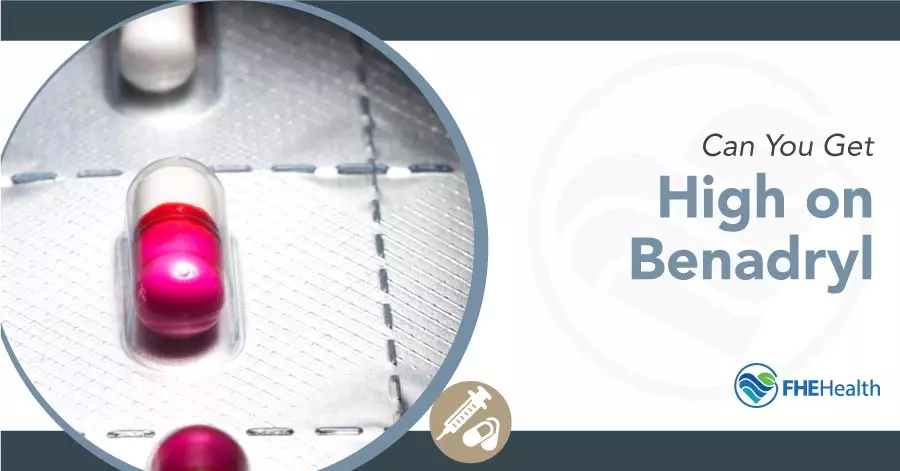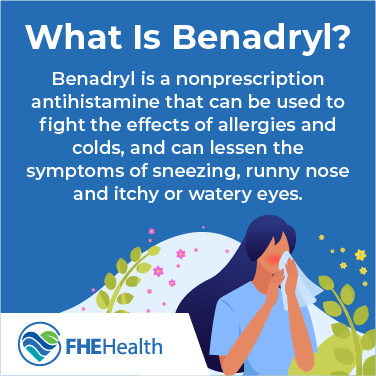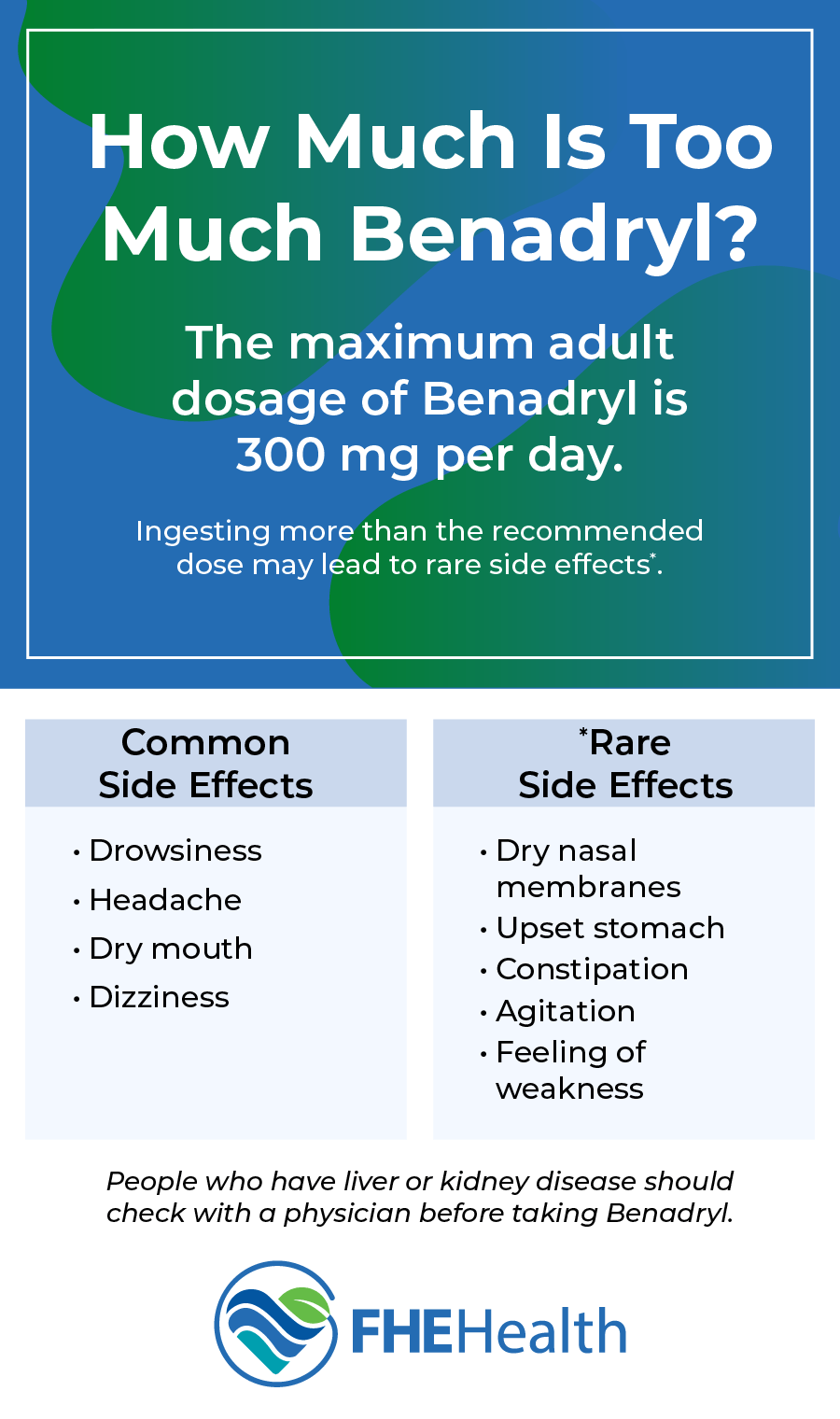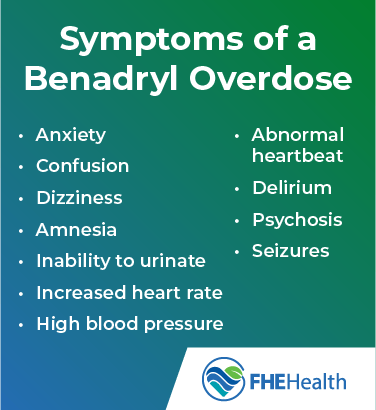
Updated on January 3, 2025
Some over-the-counter drugs, such as Benadryl, can mimic the types of high feelings that marijuana and other drugs produce. The active drug in Benadryl is diphenhydramine. When taken according to directions, this drug is meant to treat symptoms of colds and allergies, and it’s sometimes used for motion sickness or insomnia. Benadryl is usually effective and safe to use, but it can be misused as well. When taken in greater quantities than recommended, this and other nonprescription drugs can have dangerous side effects and become a danger to health.
What Is Benadryl?
 Benadryl is a nonprescription medication that can be used to fight the effects of allergies and colds. It’s classified as an antihistamine and can lessen symptoms such as sneezing, runny nose and itchy or watery eyes. Benadryl is also taken for its ability to alleviate hives and the redness and itchy skin caused by insect stings or allergic reactions.
Benadryl is a nonprescription medication that can be used to fight the effects of allergies and colds. It’s classified as an antihistamine and can lessen symptoms such as sneezing, runny nose and itchy or watery eyes. Benadryl is also taken for its ability to alleviate hives and the redness and itchy skin caused by insect stings or allergic reactions.
How Does Benadryl Work?
Diphenhydramine, the active ingredient in Benadryl, is an antihistamine, and it attacks histamines — substances produced by the body. Histamines fight bodily invaders, such as pollen and cold viruses. The antihistamine action of Benadryl stops some of the histamines from doing their job, preventing excess inflammation. Taking too much of the drug, however, can heighten side effects and be dangerous to your health.
Is Benadryl Safe to Take?
When taken in the appropriate dose, Benadryl is safe and effective. But our bodies are designed for homeostasis, a type of equilibrium that supports a narrow range of tolerance for drugs. Histamines serve a purpose, and taking too much Benadryl can inhibit them too severely, causing side effects such as blurred vision, headache, gastrointestinal discomfort and dry mouth.
Benadryl is not supposed to be used long-term, and taking it for an extended period of time can lead to problems such as anxiety, memory loss, constipation and blurred vision. It can also impair thinking and exacerbate restless leg syndrome. If long-term medication is needed, a physician can prescribe a different type of drug that’s safer to use on a regular basis.
How Much Is Too Much?
 The smallest dosage that produces relief should be used no more often than the directions on the package specified. For adults, the typical dosage for hay fever, allergies and cold symptoms is 25 to 50 mg, taken every 4 to 6 hours as needed. The maximum adult dosage of Benadryl is 300 mg per day. The four most common side effects of Benadryl, when taken as directed, are:
The smallest dosage that produces relief should be used no more often than the directions on the package specified. For adults, the typical dosage for hay fever, allergies and cold symptoms is 25 to 50 mg, taken every 4 to 6 hours as needed. The maximum adult dosage of Benadryl is 300 mg per day. The four most common side effects of Benadryl, when taken as directed, are:
- Drowsiness
- Dry mouth
- Headache
- Dizziness
Potential Side Effects and Precautions for Taking Benadryl
Several factors affect the severity of side effects, including a person’s age, weight, hydration and whether they’re taking any other medications. Ingesting more than the recommended dose may lead to dry nasal membranes, an upset stomach, constipation, agitation and a feeling of weakness. These symptoms are rare, and if you’re experiencing them, you should check with your doctor before taking any more Benadryl.
People who have liver or kidney disease should also check with a physician before taking Benadryl, and it may be contraindicated for those with:
- Heart disease
- Emphysema
- High blood pressure
- Low blood pressure
- Asthma
- Bronchitis
- Thyroid disease
- Glaucoma
Can Benadryl Get You High? Everything You Need to Know About a Benadryl Trip.
A Benadryl trip can mimic the high feeling caused by some recreational drugs due to feelings of extreme drowsiness. Large doses of Benadryl can also cause confusion and memory loss and lead to a Benadryl overdose. As with some opioids, frequent users can even develop a dependence on the drug. Ingesting alcohol or taking other drugs along with diphenhydramine can intensify the experience of being high, but it’s extremely dangerous.
Symptoms of a Benadryl Overdose
 Those searching for a Benadryl trip can end up overdosing if they take more than 500 to 1,000 mg, or 10 to 20 times the highest recommended adult dose. Certain drugs can magnify the sedative effects, and dehydration can keep the body from metabolizing the drug effectively. In extreme cases, a Benadryl overdose can lead to heart problems, hallucinations, seizures and death.
Those searching for a Benadryl trip can end up overdosing if they take more than 500 to 1,000 mg, or 10 to 20 times the highest recommended adult dose. Certain drugs can magnify the sedative effects, and dehydration can keep the body from metabolizing the drug effectively. In extreme cases, a Benadryl overdose can lead to heart problems, hallucinations, seizures and death.
A person can accidentally overdose on Benadryl by taking another dose before the last one has worn off or by forgetting and repeating a dosage. If someone who’s taken Benadryl collapses, can’t be awakened, has a seizure or has difficulty breathing, call 911 immediately. Symptoms of a Benadryl overdose may include:
- Anxiety
- Confusion
- Dizziness
- Amnesia
- Inability to urinate
- Increased heart rate
- High blood pressure
- Abnormal heartbeat
- Delirium
- Psychosis
- Seizures
Don’t Take It for the Side Effects
Some people engage in recreational drug use because they hope it will make them feel happy and excited. Benadryl doesn’t elevate the mood, provide a burst of energy, or cause feelings of euphoria. Instead, it can make a person feel jittery, unsettled and confused. It’s dangerous to try to get high on Benadryl because the drug affects the body in other ways that can be damaging and even fatal.
Factors such as other drugs and the time it takes to metabolize Benadryl can cause you to take a more dangerous dose than you realize. Diphenhydramine affects the body’s organs, especially the liver, and it can cause permanent damage to the kidneys, where it’s processed and eliminated from the body.
Help Is Available
If you’re dependent on Benadryl or any other drug, help is available. A drug treatment program can help you understand the root of the compulsion to abuse medications. FHE Health provides a nonjudgmental, safe place to explore your issues and learn how to make changes. Our compassionate healthcare professionals professionals are available to work with you one-on-one and in a group setting. Call (833) 596-3502 today, and let us help you start to recover.
Sources:
- https://www.fda.gov/drugs/drug-safety-and-availability/fda-warns-about-serious-problems-high-doses-allergy-medicine-diphenhydramine-benadryl
- https://www.medicalnewstoday.com/articles/325169#side-effects
FAQs About Benadryl Misuse and “Tripping”
Q: Is it really possible to get addicted to something I can buy at a grocery store?
A: Yes. While Benadryl is safe for occasional allergies, your brain can develop a physical reliance on it if used nightly for sleep or to “numb out.” When your body loses the ability to find its own equilibrium without a pill, it has shifted from a habit into a physical dependency.
Q: Does taking extra Benadryl actually make you feel good?
A: No, it’s usually quite the opposite. Most people report feeling unsettled, jittery, and confused rather than euphoric.
Q: If I tell a doctor I took too much, will I be judged or reported?
A: This is the fear that keeps so many people suffering in silence. Our clinicians know the difference between “recreational use” and a person who is struggling with deep anxiety or the pressure of a social media trend. Being honest doesn’t mean your support is withdrawn or that you’ll be treated like a criminal; it means we can finally provide you with a team that addresses the root of your pain without the fear of judgment or being left to handle it alone.
Q: Is there a specific dose that is considered “lethal”?
A: There is no “safe” way to misuse this drug. Because factors like body weight, heart health, and hydration vary for everyone, a dose that makes one person sleepy could send another into a life-threatening seizure or cardiac arrest.
Q: Why does Benadryl make me feel so “weird” and jittery the next day?
A: That “hangover” is your central nervous system struggling to regain balance. Because diphenhydramine stays in your system longer than many realize, it can continue to impair your memory, coordination, and mood for 24 hours or more.
Q: Can I actually go to rehab for Benadryl?
A: If your body has become dependent on Benadryl, the cycle of brain fog and the return of chronic insomnia can be incredibly overwhelming to navigate without help. At FHE Health, we provide professional tools to help you break that cycle. Whether it’s a medically supervised detox to keep you safe or a program to help you manage the stress that led you to reach for Benadyrl, we are here to help you reclaim your life.






